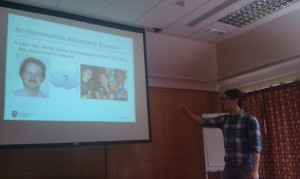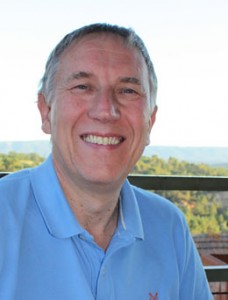Speaker: Peterri Nurmi, Helsinki Institute for Information Technology HIIT
Abstract:
Contemporary mobile phones readily support different positioning techniques. In addition to integrated GPS receivers, GSM and WiFi can be used for position estimation, and other sensors such as accelerometers and digital compasses can be used to support positioning, e.g., through dead reckoning or the detection of stationary periods. Selecting which sensor technologies to use for positioning is, however, a non-trivial task as available sensor technologies vary considerably in terms of their energy demand and the accuracy of location estimates. To improve the energy-efficiency of mobile devices and to provide as accurate position estimates as possible, novel on-device positioning technologies together with techniques that select optimal sensor modalities based on positioning accuracy requirements are required. In this talk we first introduce novel GSM and WiFi fingerprinting algorithms that run directly on mobile devices with minimal energy consumption [1]. We also introduce our recent work on minimizing the power consumption of continuous location and trajectory tracking on mobile devices [2].
[1] P. Nurmi, S. Bhattacharya, J. Kukkonen: “A grid-based algorithm for on-device GSM positioning.” Proc. 12th ACM International Conference on Ubiquitous Computing (Ubicomp, Copenhagen, Denmark, September 2010). ACM Press, 2010, 227-236.
[2] M. B. Kjaergaard, S. Bhattacharya, H. Blunck, P. Nurmi, “Energy-efficient Trajectory Tracking for Mobile Devices”, Proc. 9th International Conference on Mobile Systems, Applications and Services (MobiSys, June-July, 2011).
About Petteri:
Dr. Petteri Nurmi is a Senior Researcher at the Helsinki Institute for Information Technology HIIT. He received a PhD in Computer Science from the University of Helsinki in 2009. He is currently co-leading the Adaptive Computing research group at HIIT together with Doc. Patrik Floréen. His research focuses on ubiquitous computing, user modeling and interaction with a view of making the life of ordinary people easier through easy-to-use mobile services. He regularly serves as Program Committee Member and reviewer for numerous leading conferences and journals. More information about his research can be found from the webpage of the research group: http://www.hiit.fi/adapc/
Event details
- When: 29th July 2011 12:00 - 13:00
- Where: Cole 1.33a
- Format: Seminar



